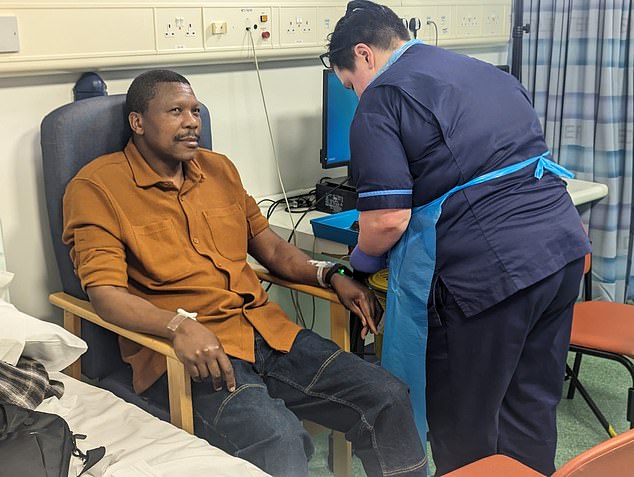‘Game-changing’ cancer vaccines are here with thousands of Brits set to be offered them in the next year in what could be a watershed moment for treating the disease.
Doctors believe the treatments — which are custom built for each patient — will herald a new era in cancer care.
Elliot Pfebve, a 55-year-old father of four, became the first patient to receive the bowel cancer version of the vaccine on the NHS, getting his first dose at University Hospitals Birmingham in March.
Medics hope the jabs, which use similar technology to some Covid vaccines will one day become a standard part of cancer care.
But how do these vaccines work? How can patients get involved? And what is exactly is their relationship to the controversial Covid jabs?


Elliot Pfebve (pictured), a 55-year-old father of four, became the first patient to receive a bowel cancer vaccine on the NHS, getting his first dose at University Hospitals Birmingham in March


Pictured, research nurses Ria (left), Hayley (right) and Dr Victoria Kunene (centre), a consultant medical oncologist at the Queen Elizabeth hospital in Birmingham


The process uses genetic material – RNA – from a patient’s tumour to develop the vaccine, which is then given to the patients via a series of infusions at hospital
Here, MailOnline answers all your questions…
How do the cancer vaccines work?
Scientists take a sample from a cancer patient’s tumour and analyse it’s genetic code.
They then use part of this, called RNA, to develop a bespoke vaccine for the patient in a lab.
When injected, the jab will deliver the instructions for the body’s cells to produce a harmless part of the tumour, provoking a response from the immune system.
This process trains the immune system to spot this element of the cancer in the future providing protection against the disease.
Traditional vaccines work on a similar principal, using a small or weakened part of a pathogen, like a virus, to help the immune recognise it as a threat.
The same technology as the cancer vaccines, called mRNA, is used the Covid jabs.
Currently the cancer vaccines are being offered in addition to standard cancer treatment like chemotherapy as way to reduce the risk of cancer returning.
It is not, in the near future at least, intended to be a standalone therapy or cure.
What kinds of cancer can they treat?
Global trials are underway for various cancers, including skin, bowel and lung cancer.
The NHS itself has signed up for patients with melanoma, prostate, head and neck cancers and bowel cancer to potentially take part.
Earlier this year it was revealed similar technology was used to help Steve Young, 52, from Stevenage whose ‘bump on the head’ turned out to be the dangerous skin cancer melanoma.
There are also hopes of using the mRNA cancer jabs to potentially treat breast, bladder and kidney cancer in the near future.
How many patients will benefit? Can I get involved?
Dozens of patients have already started receiving vaccines via the NHS through its ‘cancer vaccine launch pad’.
The health service expects this figure to reach ‘thousands’ by 2026.
Patients will be invited to take part in the cancer vaccine trial via their standard NHS cancer treatment.
Tests, using samples of their cancer tissue and blood will be used to evaluate their suitability for the trial.
The patient will still have to undergo traditional cancer treatment, such as chemotherapy, before getting the jab.
Patients will be offered the jab via a series of infusions at their nearest participating NHS site up to 12 months after their initial treatment finishes.
What is the relationship to the mRNA Covid jabs? Do they have the same side effects?
mRNA technology dates back to 2005 but it was only during the Covid pandemic that mRNA vaccines became a recognisable term to most people.
Pharma giants Pfizer, working alongside BioNTech, and Moderna both developed mRNA Covid jabs to help banish the darkest days of the pandemic.
Millions of Brits have now received one or more of these mRNA Covid jabs either part of the initial rollout or during the multiple booster campaigns.
BioNTech is one of the companies involved in the development of the new cancer vaccines, including the bowel cancer vaccine that Mr Pfebve received.
Numerous conspiracy theories about mRNA Covid jabs circulate online.
Some claim that they change your DNA, are part of global depopulation conspiracy or are behind a wave of ‘sudden deaths’ or ‘turbo-cancers’.
None of these are considered credible by respected health experts, however.
However, mRNA jabs, like any drug, carry a risk of adverse side effects the most famous of which, in the Covid versions, was a risk of myocarditis a potentially dangerous inflammation of the heart muscle.
While present, the risk has been largely overblown by conspiracy theorists, with most cases being mild that resolve on their own.
Experts have also highlighted that a Covid infection itself can also cause myocarditis.
The exact risks of side effects from mRNA cancer vaccines have not been listed as the jabs are currently only available as part of clinical trials.
Patients will be informed of all known risks and what symptoms to keep a look out for before being given the vaccine.
Are there any downsides or potential problems with the NHS rollout?
While being heralded as representing new era in fighting cancer there could be potential problems with a wider rollout.
Firstly, the jabs are still in the clinical trial phase, and while findings have so far been positive problems, both in terms of safety and efficacy, could still be discovered.
Another issue is that they are far more expensive than traditional vaccines.
Standard vaccines, like the flu and even the Covid jabs, are manufactured on a massive scale to beat a specific kind of pathogen like a virus.
In practical terms, this means you will receive the same formula of vaccine as any other person rolling up their sleeve at the pharmacy or GP practice.
However, the cancer vaccines are different.
Each patient receives a specifically crafted jab developed to target the unique genetic data of that person’s cancer.
This is a much more intensive, and therefore, expensive process.
Currently the trials are funded by drug-makers so are free for the NHS.
However, if adopted by the NHS the vaccines will have to go through a cost-benefit analysis by the health service, the same as any new medication.
This, in theory, could restrict them to certain types of cancers or particular patient groups.
Source: Mail Online






